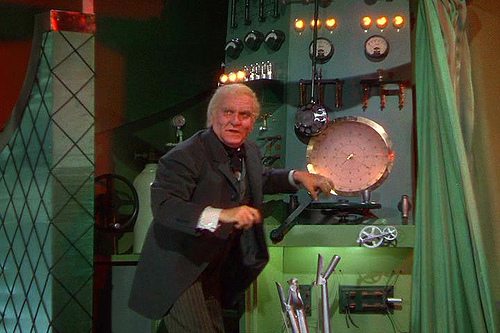Guyside: Being a good man without being a dad
I’m not a father. It’s not gonna happen. It’s not a question of “waiting for the right woman” — I found her over 20 years ago, and that’s that — or of some unfortunate biological malfunction. When my partner and I were together a while, we started to talk about children, and we decided together that we would not have any. And quite a number of years ago, we took permanent steps to ensure that we weren’t going to have children.
First off, there’s the sensitivities that any man sometimes feels about being around kids. You find yourself, at times, in strange situations. A few years ago, friends — let’s call them Dick and Jane — separated. My partner and I were at Jane’s house for dinner, and their daughter “Kate” asked if we could go to her track meet the next day. I could, so I showed up at a school field the next morning, wandering around looking for Kate or Jane. I saw Kate first, and she ran over to hug me, and as she competed, I took some pictures. Then I realized that I was just a random guy with no “real” ties to this event, taking pictures of children. And I also realized that she needed the support of people there rooting for her, and I was proud to do it.
Behind the curtain: sexual health and the culture of trust
[Frank Morgan as Oscar Diggs (aka The Wizard). All rights, MGM 1939.]
Sexual health in women. It’s truly a double-edged, damn if you do, damn if you don’t topic, wrought with landmines and a path paved with…profit. Especially female sexual dysfunction.
Female sexual dysfunction describes an amalgam of symptoms and issues around women and their sexual desire or lack thereof that include: a chronic lack of interest in sexual activity, avoidance of sexual contact, the inability to maintain excitement, difficulty in reaching orgasm after arousal, pain during intercourse, involuntary spasms that may prevent sexual penetration and genital pain following foreplay. A woman doesn’t have to experience all of them to be labeled as having female sexual dysfunction, but she must have at least one and it must cause distress.
Sounds fairly complicated, doesn’t it?
The literature and reams of data have shown that sexual function and desire in women rely on multitude of factors such as context, experience, personal attitudes, emotional closeness, wellbeing, social support and even a sense of purpose. And with the intersection and interaction of these factors, one would imagine it would take a miracle drug to combat more than one of these issues effectively and efficiently. That may be one reason why the FDA turned down the application for flibanserin a few years ago.
The back story on this ‘Female Viagra’ is that it is a antidepressant compound that is is believed to affect brain receptors and neurotransmittors that play a role in sexual response. Data presented a few years back at the European Society for Sexual Medicine conference demonstrated that in clinical studies, flibanserin significantly improved desire, sexual experience and sexual functioning in women when taken for at least six months. The majority of the women participating in these studies were pre-menopausal and had been diagnosed with hypoactive sexual desire disorder (HSDD), a condition that is characterized by a decline in sexual desire, a loss of intimacy, and distress. Yet, the FDA eventually turned down the application because they determined that despite these initial studies, the data, in concert, did not ultimately did not show that Flibanserin improved sexual desire any better than placebo. It was also associated with a number of different side effects.
Fast forward to a few weeks ago, when in response to a concerted lobbying effort by pharma, women’s organizations and even medical organizations the FDA held a two day hearing on female sexual dysfunction. And, while I did agree with that we need to ‘even the score’ to gain women’s health equity (and in so far as female sexual dysfunction goes, provide timely and effective treatments), at least four of the major sponsors of the so-called ‘Even the Score’ movement were major pharmaceutical companies with vested interests. Not surprisingly, one of these companies was Sprout Pharmaceuticals, manufacturer of Flibanerin. And, the plot thickens further…earlier this week, MedPage Today reported that the FDA hearing had an overrepresentation of individuals who had been recruited by drug companies to speak ; many had their way paid indirectly by Sprout.
Why am I sharing this and why are the stakes so great in women’s health? We are living in a time when the culture of trust is being called into question and as I wrote in a related piece on Medium a few weeks back, the culture of trust “is an integral part of women’s health and in no area has the delivery of healthcare been as exclusionary and disjointed.” Despite this gap, women are still the most frequent health information seekers, a behavior which I believe, relies on trust.
A report from the Lancet Commissions group recently stated that,“where profits take priority, the fact that health care functions in the public interest is as contestable as its business prospects are undeniable. Healthcare has, in many countries, become big business, especially when this business sees bodies as commodities to be exchanged and bartered in all of their parts.”
Here’s my point: if the information that is being delivered to women seeking care and knowledge places profit over health, then the culture of trust comes into question. If companies like Sprout Pharmaceuticals or even Novo-Nordisk hide behind the curtains of bloggers, women’s organizations and even some healthcare practitioners to highlight certain ‘diseases du jour’ if not ‘du semaine,’ then the culture of trust, like the system within which it is operating, is broken.
Professionally, I’ve worked with pharmaceutical companies and I understand when the efforts are pure and when they are not. However, be assured that I have never delivered information on this blog that would be considered lined with a conflict of interest. I have kept my promise to you to deliver information without motive. Unfortunately, I cannot say the same of many of my colleagues in the midlife women’s health space. That’s why, dear readers, I’ll be leaving it at the year’s end but more on that later. For now? I cannot encourage you enough: please look behind the curtain. After all, the All Mighty Wizard turned out to be a simple man from Kansas, didn’t he?
Read More
Guyside: What is it that power does again?
Oh yes. Corrupts.
Up here in Canada, people of a certain age and persuasion have been bathed in utter sordidness for the last week, as one of the stories I wrote about last week — that of national radio host Jian Ghomeshi — has gotten worse, and worse, and then worse again.
To recap: Ghomeshi was the host of a nationally-broadcast show on CBC Radio (and on 180 or so NPR stations in the US), a regular contributor to the CBC’s national TV newscast, and a host of a number of high-profile cultural events. He was the personification of an organization seeking a younger, hipper demographic. About a week ago, it was suddenly announced that he was taking an indefinite leave. The immediate assumption was that he was taking time to deal with his father’s recent death.
But by Sunday, he’d written a 1600-word Facebook post that said he was fired, and fired because of revelations of his private sexual behaviour (what he described as being “adventurous in the bedroom”) made by a jilted ex-girlfriend. By now, he’s been the subject of allegations of both workplace sexual harassment and of assaultive behaviour with women in his life, some of whom remain anonymous and some of whom have gone public. His career is in tatters, he’s gone to ground, a Toronto police investigation is underway, his former employer has launched a major inquiry, and a national conversation has begun, thanks to the Twitter hashtag #beenrapedneverreported.
So this is about power. If the allegations against Ghomeshi are true, it seems clear that his power as a media personality allowed him to behave in a reprehensible way with little fear of being “called out” for it. In fact, one producer on his radio show who reported harassing behaviour was allegedly told “he’ll never change, so what can you do to make the workplace less toxic?” by the show’s executive producer.
So here’s the thing. If you are a man who is abusive of women, a sexual harasser, not much I will say here will resonate. But I’ll simply say STOP. Stop what you’re doing. But if you’re not, if you’re horrified by the thought that women are dry-humped in the workplace, that a male colleague would whisper in a female colleague’s ear “I want to hate-f*** you,” etc.: then you’re with me. We need to stop tolerating this in our fellow men. We need to be the sunlight that disinfects the places we work and live to ensure that EVERYone can work and live without fear of assault; we need to be willing to make noise.
If there’s something that this whole tawdry story has taught — or can teach — men, it’s that THIS IS NOT JUST A WOMEN’S PROBLEM. And as I edge toward being a “senior” person in contexts, I’ve realized that while whatever power I possess can corrupt, it can also disinfect, if I have the courage to use it. Who’s with me?
Read More








